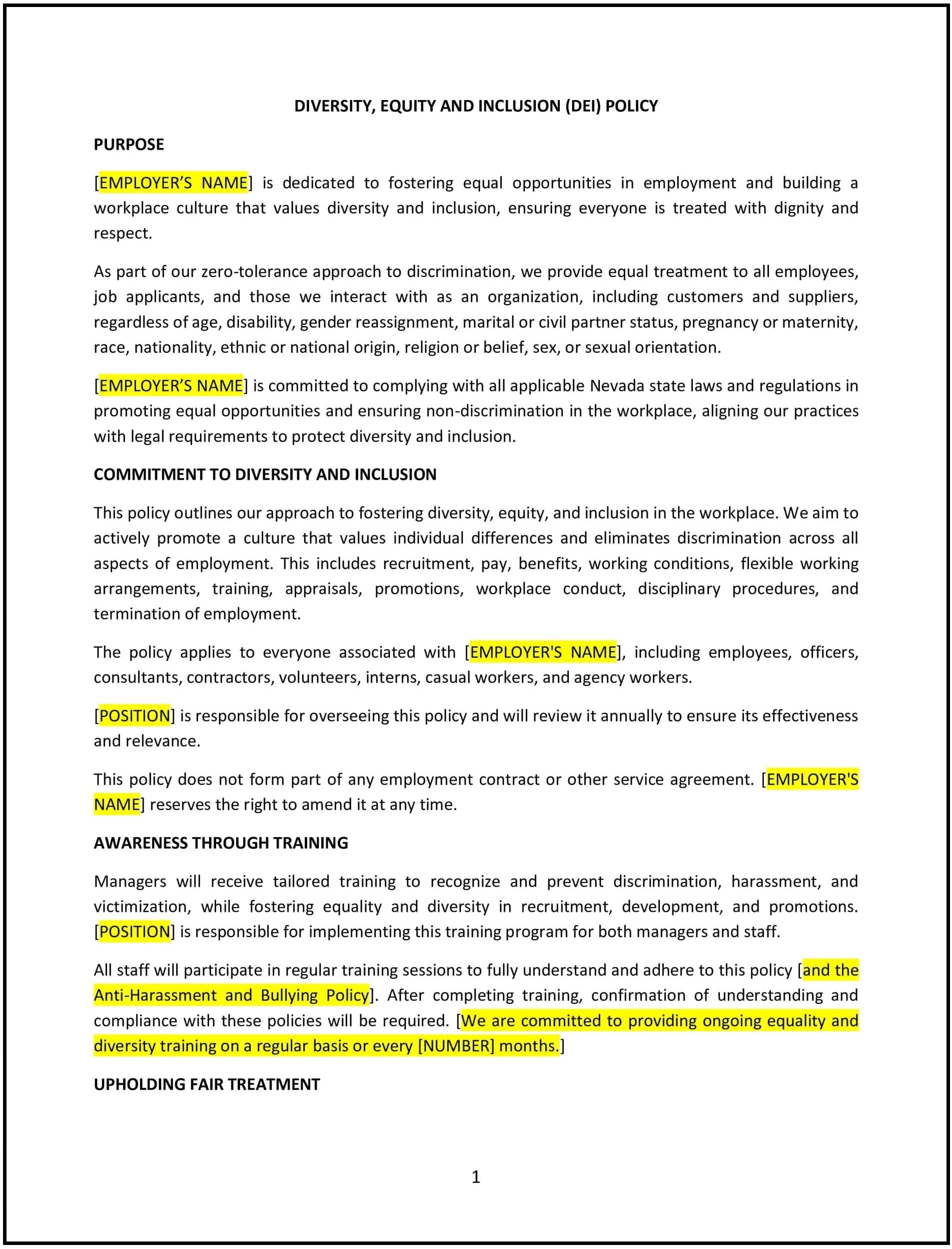Diversity, equity, and inclusion (DEI) policy (Nevada): Free template
Got contracts to review? While you're here for policies, let Cobrief make contract review effortless—start your free review now.

Customize this template for free
Diversity, equity, and inclusion (DEI) policy (Nevada)
This diversity, equity, and inclusion (DEI) policy is designed to help Nevada businesses create a workplace that values diversity, fosters equity, and promotes inclusion. It outlines the company’s commitment to building a diverse workforce, providing equal opportunities for all employees, and creating an inclusive work environment where everyone feels respected and valued.
By adopting this policy, businesses can foster a culture of respect and fairness, improve employee engagement, and enhance organizational performance through a more diverse and inclusive workplace.
How to use this diversity, equity, and inclusion (DEI) policy (Nevada)
- Define diversity, equity, and inclusion: Clearly define the terms “diversity,” “equity,” and “inclusion” in the context of the workplace. Diversity refers to the presence of differences among employees, equity refers to fairness and equal treatment, and inclusion refers to creating a culture where all employees feel welcomed and valued.
- Set goals and objectives: Outline the company’s DEI goals, such as increasing workforce diversity, promoting equitable hiring practices, or enhancing inclusion initiatives. Set measurable objectives to track progress.
- Foster a respectful work environment: Emphasize the importance of treating all employees with respect and dignity, regardless of race, ethnicity, gender, age, sexual orientation, disability, religion, or any other characteristic.
- Promote fair hiring practices: Outline the company’s commitment to fair and unbiased hiring, recruitment, and promotion practices that provide equal opportunities to all applicants and employees.
- Support employee development: Commit to providing all employees with equal access to training, mentorship, and career advancement opportunities, ensuring that they can grow and thrive within the organization.
- Create an inclusive culture: Encourage open communication and collaboration, where employees feel safe sharing their ideas and perspectives. Promote activities, events, and resources that support DEI.
- Address discrimination and harassment: Make it clear that discrimination, harassment, or retaliation based on any protected characteristic will not be tolerated, and establish clear procedures for reporting and addressing such behavior.
- Measure and report progress: Regularly assess the effectiveness of DEI initiatives and report progress toward DEI goals, ensuring transparency and accountability within the organization.
Benefits of using this diversity, equity, and inclusion (DEI) policy (Nevada)
This policy provides several key benefits for Nevada businesses:
- Promotes a positive workplace culture: Fosters an inclusive and respectful environment where employees feel valued, leading to higher morale and productivity.
- Enhances recruitment and retention: A strong commitment to DEI helps attract top talent from diverse backgrounds and improves employee retention by creating a more supportive and equitable work environment.
- Improves organizational performance: Research shows that diverse and inclusive teams are more innovative, make better decisions, and perform better overall.
- Strengthens reputation: A commitment to DEI enhances the company’s reputation, both internally with employees and externally with clients, customers, and the community.
- Promotes legal compliance: Helps businesses comply with Nevada state laws and federal regulations regarding equal opportunity, anti-discrimination, and workplace fairness.
Tips for using this diversity, equity, and inclusion (DEI) policy (Nevada)
- Communicate the policy effectively: Ensure that all employees are aware of the DEI policy and its importance. This can be communicated through employee handbooks, training sessions, and internal communications.
- Lead by example: Company leaders and managers should model inclusive behaviors and actively promote DEI in their interactions with employees.
- Regularly review and update the policy: The DEI policy should be reviewed periodically to ensure it remains aligned with company goals, employee needs, and changes in Nevada law or best practices.
- Provide DEI training: Offer regular training and development opportunities for all employees to learn about DEI, including unconscious bias training, cultural competency, and inclusive leadership.
- Track and measure progress: Use metrics and data to assess the effectiveness of DEI initiatives and track progress toward meeting DEI goals. Regularly report on outcomes to employees to maintain transparency.